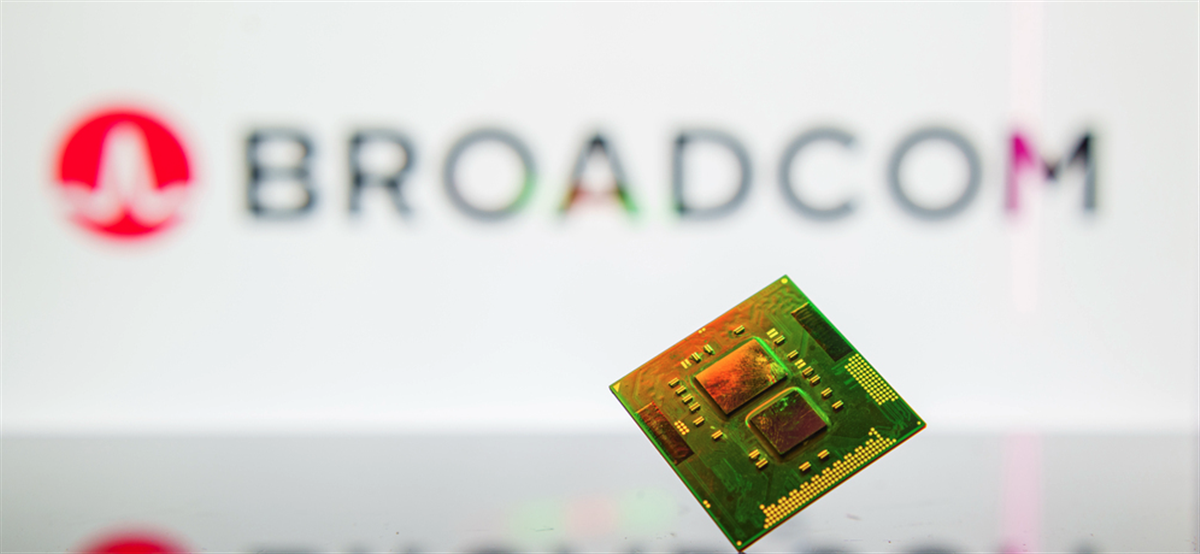
Amid all of the tariff-related volatility in the market, semiconductor leader Broadcom (NASDAQ: AVGO) has fared better than many. Since Trump’s tariff announcement hit markets on Apr. 3, shares of Broadcom are up nearly 8% as of the Apr. 9 close.
This performance is impressive, considering the S&P 500 Index is down nearly 3% over that period. The Invesco PHLX Semiconductor ETF (NASDAQ: SOXQ) is down 2%.
[content-module:CompanyOverview|NASDAQ: AVGO]However, Broadcom dropped over 10% on Apr. 3 in reaction to the Liberation Day announcement.
It dropped another 5% the next day as the Chinese announced reciprocal tariffs. Thus, markets clearly feel Broadcom has some tariff risk.
This comes even though Trump excluded semiconductors from his tariffs.
The analysis below will break down Broadcom’s tariff exposure in two ways: direct and indirect exposure.
It will also examine why the stock has performed comparatively well.
Direct Tariff Implications: Semiconductor Exemption Provides Respite
Overall, because semiconductors are exempt from the tariffs, Broadcom’s direct exposure is somewhat minimal. However, tariffs on semiconductors could be coming. President Trump recently said that tariffs on chips will come “very soon”. This would create a significant effect on Broadcom’s business. In 2024, 20% of the firm’s total revenues came from China. Tariffs on these goods would hamper demand in the country.
However, at the moment, the direct impact of tariffs on Broadcom isn’t the main concern, especially with Trump softening his stance. He announced that countries that don’t enact retaliatory tariffs will be exempt from the latest U.S. tariffs. This sent the market—and Broadcom shares—soaring. It signals that Trump isn’t drawing a hard line in the sand and could ease his aggressive tariff policies. It also suggests he may walk back the idea of implementing chip tariffs.
Notably, tariffs haven’t been a big topic of conversation at Broadcom’s meetings with analysts. Since Aug. 2024, participants in the firm’s five earnings or conference calls have used the word “tariffs” a total of just three times.
Indirect Tariff Implications: Broadcom’s Bigger Problem
The indirect impact of tariffs is likely to be much more impactful on Broadcom. Imported products that contain Broadcom’s chips are subject to tariffs. The vast majority of chip manufacturing takes place in Asia, meaning that final products shipped to the U.S. will face higher costs.
[content-module:Forecast|NASDAQ: AVGO]These higher costs will degrade demand for these products and thus the Broadcom chips inside them. This could affect both Broadcom’s AI chip and non-AI chip businesses. Both made up just under 28% of revenue last quarter.
Within non-AI chips, Broadcom has large exposure to Apple (NASDAQ: AAPL), which uses its chips in its consumer devices. With tariffs expected to impact Apple sales and profits, Broadcom will likely also take a hit.
Broadcom’s AI servers could also be significantly impacted by Asian manufacturing. Reports indicate that, in general, 60% of AI servers are made in Mexico, and 30% come from Taiwan. Stacy Ragson of Bernstein Research does not expect the tariffs to affect those servers made in Mexico.
If Broadcom’s AI server manufacturing is similar to these figures, it could avoid a significant amount of tariffs on its AI business. It is important to note that the locations of companies making these servers for Broadcom are unknown. Actual figures could be significantly different.
Why Broadcom Has Performed Relatively Well in Bad Market Conditions
One likely reason that Broadcom shares have held up relatively well is that its AI customers are hyperscalers. These companies are cash-rich and view AI as massively important to their long-term goals. This means a big chunk of Broadcom’s sales has a chance to remain largely intact as these firms prioritize spending on AI.
Additionally, infrastructure software made up 45% of the firm’s revenue last quarter. This isn’t affected by current tariffs. However, companies could cut back on spending here to make up for higher costs in other areas.
Another factor that has been a boon to Broadcom shares is a big announcement it recently made. Broadcom announced a $10 billion share buyback program after the market close on Apr. 7, a sign of Broadcom’s continued confidence in its business and ability to generate cash despite the uncertain macroeconomic environment ahead.
Overall, there is reason to believe that Broadcom has moderate insulation from tariffs. However, if tariffs lead to a recession, this would certainly be bad for business. It will be very interesting to see what management has to say about tariffs going forward.
Where Should You Invest $1,000 Right Now?
Before you make your next trade, you'll want to hear this.
MarketBeat keeps track of Wall Street's top-rated and best performing research analysts and the stocks they recommend to their clients on a daily basis.
Our team has identified the five stocks that top analysts are quietly whispering to their clients to buy now before the broader market catches on... and none of the big name stocks were on the list.
They believe these five stocks are the five best companies for investors to buy now...





